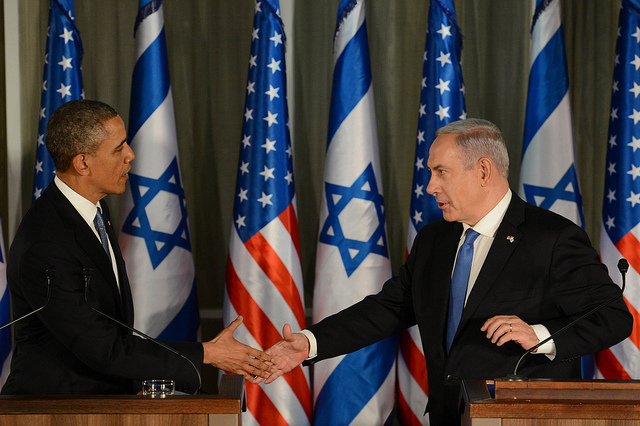by Robert E. Hunter
President Barack Obama spent three days in the Near East, a whirlwind visit like a genie from the Arabian Nights, kicking up dust and making his presence felt. But what did he achieve?
Two substantive matters stand out: $200 million promised to the King of Jordan to deal with that country’s horrendous refugee program stemming from the Syrian Civil War and the “trailer talk” between Israeli Prime Minister “Bibi” Netanyahu and Turkish Prime Minister Recep Tayyip Erdogan, with the US president as a facilitator. Related to the Israeli attack on a Turkish vessel carrying supplies to Gaza in 2010, this was one of those classic diplomatic imbroglios in which neither side is prepared to be the first to back down. Obama’s role was thus instrumental, a true honest broker.
What else? Atmospherics, mostly, and mostly on the Israeli side, where Obama has been accused of being insensitive to Israeli feelings, in part because of his poor relations with Netanyahu, and not visiting the Holy Land during his first term as president. This is not just the stuff of a relationship on the rocks; it also impacts Obama’s ability to advance US interests in the Middle East in two ways. First, in US domestic politics, where, like it or not, the supporters of Israel (more particularly, supporters of its government) are a major force to be reckoned with, not just on Arab-Israeli issues, but also on the full range of Middle East issues and the president’s domestic agenda. Second, what the US does with Israel and what it’s able to get Israel to agree to do is the starting point for any progress in its relations with the Palestinians. Israel occupies most of the disputed land, after all. Even more importantly for the United States, Israeli cooperation also provides flexibility for the US President, including in his domestic politics, to deal with other matters in the region — matters far more critical at the moment than the Israel-Palestine issue — especially in regard to Syria and Iran.
Hence, the president was quite right in doing what he should have done a long time ago: demonstrating, to the extent that it can be done through words and the symbolism of his Israeli visit destinations, that his heart is in the right place. Hard-boiled Israeli leaders — and they are paid to be so, especially with Israel’s objective circumstances — clearly believe that Israel’s capacity to rely on US security guarantees depends on Israel being seen by US leaders as strategically important. In the Cold War, where the US and the Soviet Union mostly chose sides, Israel’s strategic connection to the US was obvious. That has been far less clear since the Egypt-Israel Peace Treaty of 1979, which vastly reduced the risk of an Arab war on Israel (and hence the risk of a US-Soviet nuclear confrontation), and then the collapse of the Soviet Union. Israel has sought since then to identify areas in which its strategic interests are at least compatible with those of the United States. This helps to explain why Israel emphasizes the threat from Iran far beyond what objective US analysts see in terms of a potential direct threat to the US, just as Israel and its supporters in the US were instrumental in pressing the United States to invade Iraq a decade ago.
But at heart, the US commitment to Israel’s security and future is not about strategy — after all, the US was committed to Vietnam and then walked away and is doing the same now with Afghanistan. The US commitment is “of the heart”, and has to extend far beyond the US Jewish community, which is a small fraction of the US population. In fact, support for Israel as a democracy, as a haven for survivors of the Holocaust and as a productive Western society with Western values, is both broad and deep in US culture and society. This is the most solid basis for Israeli confidence in America’s commitment. And reinforcing that sense of identification does not come out of a strategy text book but out of demonstrations of the unprovable: repeated reassurances of American love for Israel and what it represents, in hearts and not heads.
Of course, this is deeply frustrating for most Arabs, including virtually all Palestinians. This was underscored on Obama’s trip, when he limited himself largely to “words” and not “music.” He made little effort to connect with this people, who have labored under Israeli occupation for nearly 46 years, in terms that they could relate to emotionally.
Nevertheless, Obama did say many of the right things — Israeli settlements on the West Bank are “counterproductive” (but not “they should be stopped and maybe even rolled back in places”) and a two-state solution is important for everyone including Israel. In making the latter case eloquently to Israeli young people during his Jerusalem speech, Obama also added another point: the founding generation of Israeli leaders is passing from the scene, and a new generation needs to chart Israel’s future. It was not an accidental comment. In fact, this may be Obama’s “long game” — not that he’s expecting to be the one decisive player in resolving the standoff, but that perhaps over time, young Israelis and Palestinians will be able to do it themselves. In fact, as confirmed by public opinion polling in the two communities, the people want to go in that direction; it’s the leaders who haven’t found their way.
But none of this actually moves anything forward in the Middle East. The Secretary of State, John Kerry, will assume the burden of being lead US negotiator, a poor use of his time overall, given that the chances of moving the “peace process” forward are so poor. They come up against the fact that, when push comes to shove, psychologically, Israel is not willing — understandably so — to take risks for peace in view of grave uncertainties about Egypt, Syria, and Iran. And the President of the Palestinian Authority, Mohammed Abbas, can take no risks for peace as long as Israel keeps Gaza isolated and its people, lacking economic hope, dependent on Hamas.
At least with his trip, Obama has taken limited steps that had to be taken in regard to the Middle East as a whole — with the reconciliation between Turkey and Israel, and the reassurances of where his heart lies to Israel. But the administration still lacks an overarching perspective on the region. It has no real strategy (does anyone?) regarding a way forward on the Syrian civil war. There is no visible planning about the aftermath. The administration does not seem to be taking seriously the rising, if slow-rolling, civil war throughout the region between Shi’a and Sunni states and communities, and Washington is unwilling to tell Saudi Arabia, Qatar and the UAE to stop their nationals from funding Islamist fundamentalism in Syria and elsewhere and where the US suffers directly — including in terms of combat casualties — in Afghanistan and Pakistan, from what these three countries tolerate among their rich supporters of religious extremism. The United States also continues to lead a policy of continued isolation of Iran while refusing to engage in negotiations that meet the first test: the consideration of legitimate Iranian security interests, as well as those of the United States and Israel — a sine qua non for success. He argues that “all options are on the table,” but a serious approach to negotiations is not one of them. Obama has thus, like his two predecessors, given a critical hostage to fortune: that keeping the US out of a war with Iran — which the American people do not want, and which would be even more destructive to US interests than the misbegotten invasion of Iraq — depends not on independent US decision-making, but on the good sense of two other countries, Israel and Iran. No great power should ever get itself into such a predicament.
The key issue now is whether the US president will take a step back, engage the best that there is in the US professional community on the Middle East; bring the right people into the government; consult with others outside; and for the first time in his presidency, develop a coherent, viable strategy for the region as a whole that is consonant with the deepest and most critical US interests in the region.
At the very least, in looking at the Middle East and his administration’s approach to it, President Obama needs to fashion a team of hard-nosed thinkers and doers, akin to what Franklin Roosevelt did in World War II and various administrations did during the Cold War. As the Chief of Naval Operations, Admiral Ernest King, said in 1942: “When the going gets tough, that is when they send for us sons of bitches.” Obama needs to view the Middle East and US interests through a similar optic and bring in the first team.
Photo: Prime Minister Benjamin Netanyahu and US President Barack Obama holding a joint press conference at the Prime minister’s residence in Jerusalem. March 20, 2013. Credit: Kobi Gideon





